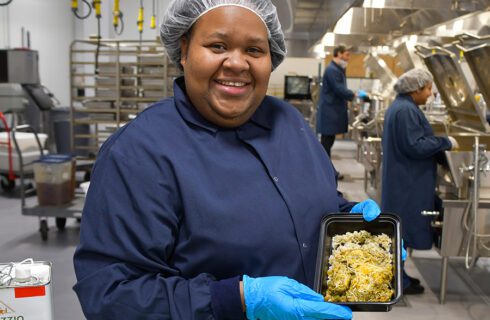The ongoing partial shutdown of the federal government affects thousands in Cook County.
The Food Depository urges Congress and the White House to end this unnecessary hardship. Our blog post discusses the shutdown's impact on food banks and the people we serve.
ABC7 Chicago visited the Food Depository to report on the shutdown and its impact on federal workers. "When people miss paychecks, they might have trouble putting food on their table," said Jim Conwell, the Food Depository's Senior Director of Marketing & Communications.
Food Assistance During the Shutdown
If you need help affording food, here's what you should know about the federal government shutdown. Our network of programs is here to help: find one near you.
SNAP Benefits: "Early, not extra"
SNAP recipients in Illinois will receive their February benefits on or around January 20, 2019. This is about two weeks earlier than usual. “It’s going to be really important that people understand that this is early and not extra. These benefits have to last them through the end of February,” said Illinois Department of Human Services Secretary James Dimas.
Meanwhile, food retailers are concerned about the effects on their businesses. A Chicago Tribune report describes the issues, from licensing delays for new businesses to a potential rush on groceries.
Applications for SNAP are still being processed during the shutdown. The Food Depository's Benefits Outreach team can help you apply or recertify.
Food Assistance for Federal Workers
The Food Depository and our local network of partner agencies and programs are here to provide food for anyone in need, including federal workers affected by the shutdown. Visit our Find Food map to locate a pantry or program near you.
On WBEZ, federal workers discussed the impact of the shutdown on their lives. Federal employees like Florence Cannon say they have cleared out their savings to meet basic needs. During their furlough, some USDA workers spent the day volunteering at the Food Depository. “We work with nutrition and food and we felt we had to do something to help people because we’re not able to help people normally in the way that we do every day in our jobs,” said Michael Meltzer, a program specialist at the USDA.
The New York Times spoke with Kate Maehr, Executive Director and CEO of the Food Depository. She expressed the challenges that federal workers face as many seek out food assistance for the first time. “What has struck me is how overwhelmed and underprepared federal workers are for these circumstances: ‘Where do I get food? How do I get rental assistance? How do I get help paying my utilities?’” Maehr said.
Food pantries and programs in the Food Depository's network have already seen an increase in calls and visits from federal workers. “We want to make sure they know it’s O.K. to come to us,” said Lyle Allen, Executive Director of Care for Real. “Something as devastating as the federal shutdown just causes a catastrophe for their home life.”
Share This Post



